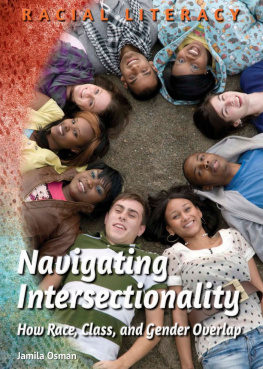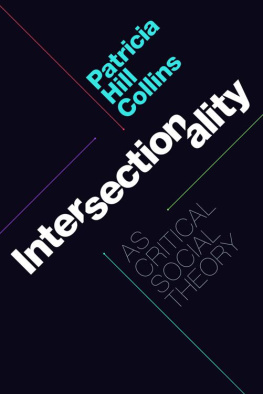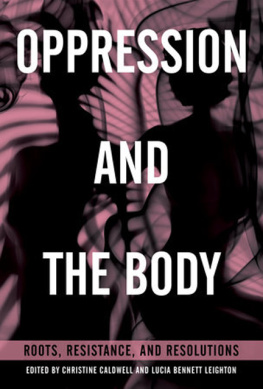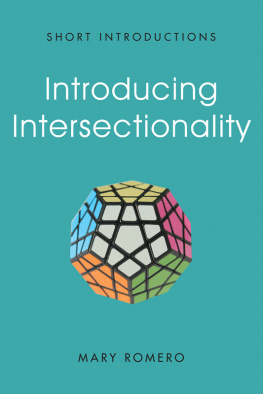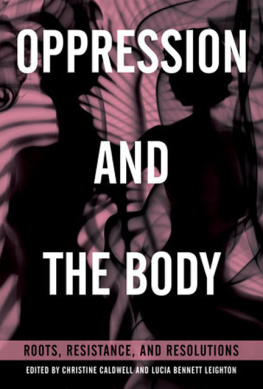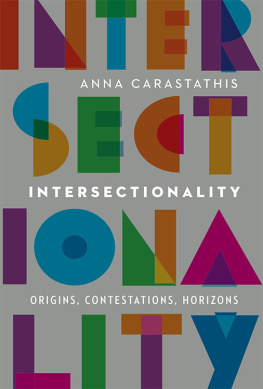
Thickening Fat
Thickening Fat: Fat Bodies, Intersectionality, and Social Justice seeks to explore the multiple, variable, and embodied experiences of fat oppression and fat activisms. Moving beyond an analysis of fat oppression as singular, this book will aim to unpack the volatility of fatthe mutability of fat embodiments as they correlate with other embodied subjectivities, and the threshold where fat begins to be reviled, celebrated, or amended. In addition, Thickening Fat explores the full range of intersectional and liminal analyses that push beyond the simple addition of two or more subjectivities, looking instead at the complex alchemy of layered and unstable markers of difference and privilege.
Cognizant that the concept of intersectionality has been filled out in a plurality of ways, Thickening Fat poses critical questions around how to render analysis of fatness intersectional and to thicken up intersectionality, where intersectionality is attenuated to the shifting and composite and material dimensions to identity, rather than reduced to an add difference and stir approach. The chapters in this collection ask what happens when we operationalize intersectionality in fat scholarship and politics, and we position difference at the center and start of inquiry.
May Friedman is an Associate Professor in the Ryerson University School of Social Work and Ryerson/York graduate program in Communication and Culture, and she holds a PhD in Womens Studies from York University. Dr. Friedman has a long publication history including the award-winning monograph Mommyblogs and the Changing Face of Motherhood (2013), as well as several edited collections.
Carla Rice is Professor and Canada Research Chair specializing in Embodiment/Subjectivity Studies and in Arts-based/Research Creation Methodologies at the University of Guelph, and she holds a PhD from York University in Gender and Womens Studies. She founded ReVision: The Centre for Art and Social Justice as a leading-edge creative research center with a mandate to foster inclusive communities, well-being, equity, and justice. She has received numerous awards for advocacy, research, and mentorship including the Feminist Mentorship Award and the Mary McEwen Award for Outstanding Gender Studies Scholarship, and she was recently inducted into the Royal Society of Canada, College of New Scholars, Artists and Scientists. She has published numerous books and articles, and directs multiple research grants.
Jen Rinaldi is an Assistant Professor in the Legal Studies program at Ontario Tech University. She earned a doctoral degree in Critical Disability Studies at York University, and a masters degree in Philosophy at the University of Guelph. She and Kate Rossiter authored Institutional Violence & Disability: Punishing Conditions (2018).
First published 2020
by Routledge
52 Vanderbilt Avenue, New York, NY 10017
and by Routledge
2 Park Square, Milton Park, Abingdon, Oxon, OX14 4RN
Routledge is an imprint of the Taylor & Francis Group, an informa business
2020 Taylor & Francis
The right of May Friedman, Carla Rice, and Jen Rinaldi to be identified as the authors of the editorial material, and of the authors for their individual chapters, has been asserted in accordance with sections 77 and 78 of the Copyright, Designs and Patents Act 1988.
All rights reserved. No part of this book may be reprinted or reproduced or utilised in any form or by any electronic, mechanical, or other means, now known or hereafter invented, including photocopying and recording, or in any information storage or retrieval system, without permission in writing from the publishers.
Trademark notice: Product or corporate names may be trademarks or registered trademarks, and are used only for identification and explanation without intent to infringe.
Library of Congress Cataloging-in-Publication Data
A catalog record for this title has been requested
ISBN: 978-1-138-58002-2 (hbk)
ISBN: 978-1-138-58003-9 (pbk)
ISBN: 978-0-429-50754-0 (ebk)
We are grateful for the community that made this book possible, which came together for critical collaboration, delightful conversation, and delicious cake. Like many such endeavours, the finished volume doesnt convey the many different forms of labour that led to its completion and the many different supports that allowed the book to come to life. May would especially like to thank Carla and Jen for exemplifying what feminist collaboration should look like: support, guidance, challenge, and a lot of love. Carla shares in that gratitude and wants to thank May and Jen for their incredible smarts, Jen for her quirky humour, and May for truly fantastic baking. And Jen owes a great deal to May and Carla for their mentorship and their generosity of spirit. On a final note, Carla needs to thank her body for bearing the burdens of her own and others punishments, and for teaching her in a small way something of what is required to survive, create, and even celebrate in the face of adversity and injustice.
Before there was a book, there was the splendid Thickening Fat Symposium, a two-day event that enabled authors to present draft chapters. Support for the symposium was generously offered by the Social Sciences and Humanities Research Council of Canada (SSHRC), Ryerson Universitys Faculty of Community Services and the Office of the Vice President of Research and Innovation; the University of Ontario Institute of Technology; the ReVision Centre for Art and Social Justice at the University of Guelph; and the SSHRC-funded Partnership Grant, Bodies in Translation: Activist Art, Technology and Access to Life. We owe thanks to the artistsin particular our Master of Ceremonies Sabrina Friedmanwho performed at a fabulous and funky cabaret that reminded us to keep connected to community and to imagine intersectionality on artistic and theatrical registers. The symposium was a success, in part, thanks to the administrative support of the fabulous Farrah Trahan and the management skills of the uber-host, Tracy Tidgwell.
The process of completing this volume was greatly aided by the exceptional organizational prowess of Kelsey Ioannoni. Kelsey supported Thickening Fat from its inception as a vague idea and has helped us immeasurably at every stage. She also provided logistic and emotional support for the symposium. We truly would have been lost without her.
We appreciate the guidance we have received from Samantha Barbaro and Erik Zimmerman at Routledge. The tremendously talented Paul Richards created the gorgeous cover artwork, was gracious when we slid into his Tumblr DMs, and gave us permission to use his work. We thank the anonymous reviewers who offered useful commentary and helped to strengthen our conviction about the necessity of the collection.
Finally, our deep gratitude goes to the authors of this volume. The symposium and subsequent chapters allowed us to engage in conversation that truly thickened our understanding of fat in the best possible ways. The wisdom, sensitivity, and thoughtfulness that authors offered to this topic have genuinely pushed our thinking further and, we hope, will thicken Fat Studies as a field.
Jen Rinaldi, Carla Rice, and May Friedman
We are in constant dialogue with fat. We consider where our fat lives on our bodieshow to grow it, contain it, remove it, and prevent it. We check fat grams and make choices about what types of fat to put into our bodies. The historical and contemporary absence of fatwhether in flesh or in foodis not benign but is typically governed by a range of disciplinary practices designed to keep fat at bay. The presence and history of fat is deeply embodied and deeply emotional but is also bound up in other structural zones of oppression and privilege. It is impossible to think about fat without thinking about colonialism, for example, and the ways that food, wellness, exercise, lifestyle, and health are profoundly and palpably shaped by a colonized landscape. Likewise, thinking about fat in and on, as well as taken into and expelled from, our bodies is inextricably bound up in thinking through our cultures broader notions of normalcy and madnesshow the self-governance and the individual responsibility required to adhere to mainstream views of health are inextricably entwined with the anxieties of neoliberalism.


